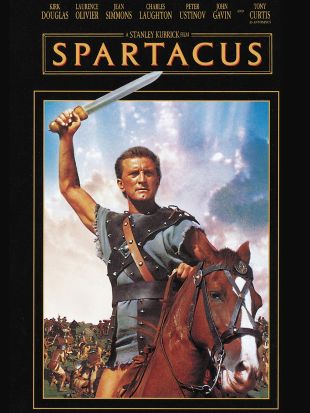
A remarkably expensive production for the time ($12m) that took 167 days to film, Spartacus has been lauded as the "thinking man's" epic because it lacks a happy ending and places as much emphasis on oration as action. The slave revolt storyline, penned in part by the blacklisted Dalton Trumbo, is clearly meant to parallel contemporary American political reality. The decadent Romans are grotesquely shaped versions of the Hollywood movie moguls gleefully leeching the talent, who come in the form of noble battling gladiators in the film. The optimistic liberal message is delivered with a heavy handed via speech spouting slaves, and led director Stanley Kubrick, who was not a big fan of the final product, to complain that the film "had everything but a good story." Kubrick was brought aboard after Kirk Douglas and the film's original director Anthony Mann clashed very early in the production. Although Douglas gives a strident and muscular performance, it is the supporting cast, led by Academy Award winner Peter Ustinov and Laurence Olivier who steal the picture. While it suffers from some of the flaws of epics of this era-such as an overly sanitized portrait of life at the time, and anachronistic visions of fashion and lifestyle-Spartacus also boasts some stirring action and intelligent dialogue. The final scenes of crucified rebel slaves lining the roads to Rome are unforgettably powerful. Propelled by Alex North's triumphant score and filmed in glorious "Super Technirama" 70mm, the wide screen format serves the stirring and spectacular action sequences, some of which used up to 8500 extras, very well. Oscars went to Ustinov, for best supporting actor, art direction, costume design and cinematography.
